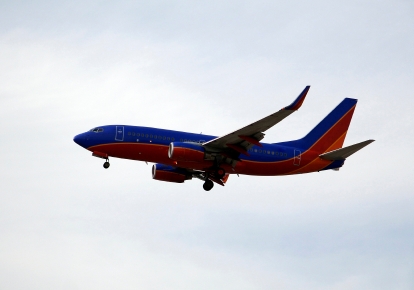
Hurricanes, earthquakes, floods—heck, even strikes—are all events one could reasonably consider beyond an airline’s control. Airlines classify these events as “force majeure,” literally an “act of God,” (Ed. note: “Force majeure” is atually French for “superior force”; “acts of God” are considered force majerue events.) and absolve themselves of any liability when flights are cancelled as a result. Passengers are issued a refund, but otherwise are left on their own.
It’s significant, then, that Southwest has quietly added “mechanical difficulties” to its list of force majeure events, alongside wars, volcanic eruptions, and riots. In effect, Southwest is saying that if something breaks on a plane, and a flight cannot be completed as a result, Southwest is not responsible for anything beyond a refund and a “good luck.” The potential implications as an industry precedent are clearly quite serious.
First, some backstory. Airlines make little changes here and there to their contracts of carriage. This change was first noticed by the New York Times‘ Susan Stellin, who noted it in passing in an article about airline liability. “Basically,” she wrote, “the only time an airline might take responsibility for a delay or cancellation is when there’s a problem with the aircraft, although Southwest even includes ‘mechanical difficulties’ in its list of not-our-fault situations.”
Click on over to Southwest’s contract of carriage, and sure enough, there it is. In section 6, Southwest says, in reference to force majeure events, that “the sole recourse of any Passenger refused transportation or removed en route will be the recovery of the refund value of the unused portion of his Ticket. Under no circumstances shall Carrier be liable to any Passenger for any type of special, incidental, or consequential damages.”
I called Southwest to get a little background on the change, and was told that previously, the airline’s contract of carriage didn’t define force majeure with the same amount of detail. On June 16, however, the contract was updated, and force majeure was given a list of qualifying circumstances, including mechanical difficulty. Southwest claims its internal definition of force majeure hasn’t changed, but that doesn’t really matter from a customer’s perspective. What matters is what the airline puts in writing, because that’s what a customer can rely on for recourse in the event of a cancelled flight. The “update,” then, was a de facto policy change.
Southwest claims that it empowers its employees to make decisions on the fly, and I was told that the airline would try to assist passengers above and beyond what’s written in the contract. That’s all well and good, and quite frankly there’s no particular reason to think Southwest, which has earned a reputation for good customer service, wouldn’t do so. But the point here isn’t that Southwest is saying it won’t give passengers more than a refund, but rather that it doesn’t have to, meaning passengers stranded by a “mechanical difficulty” can neither expect nor demand anything more than a refund as compensation for the inconvenience.
From a practical standpoint, the main problem with Southwest’s change lies with the semantics. What, exactly, does “mechanical difficulties” mean? How severe does an issue have to be for Southwest to play the force majeure card and leave everyone stranded? Southwest wouldn’t say, and the language is, clearly, intentionally vague. For example, other airlines, including JetBlue and Continental, specify “damage to aircraft by a third-party” as a force majeure circumstance. This strikes me as a truer interpretation of the concept.
Which brings us to the philosophical and ethical core of this issue. Southwest is saying that it’s not its fault if something breaks. Think about that. Southwest is essentially absolving itself of any responsibility its repair services have for maintaining its schedule. The Southwest spokesperson I talked with compared airplanes to cars, saying that even well-maintained cars break down unexpectedly. But Southwest is a business, and part of its business is maintaining operational aircraft and accepting responsibility whenever a plane cannot fly.
As a potential industry precedent, this idea is downright scary. Sure, it’s in no airline’s best interest to cancel flights and hand out refunds, but language like this at least gives airlines an easy way out when something fails. Instead of obligating itself to special compensation—anything from meal vouchers to hotel nights—and the often messy business of finding alternate transport, other airlines could simply adopt the Southwest model and cut a refund check. Problem solved!
Well, not for the airline’s passengers, whose problems are just beginning when that flight is cancelled. With hurricanes and many other weather events (even volcanoes), airlines can at least proactively cancel flights, giving passengers an opportunity to deal with related reservations (hotels, car rentals) and even arrange alternate transportation. With mechanical issues, on the other hand, one assumes many cancellations will be day-of or last-minute, when it’s too late or impractical to reschedule a trip, effectively stranding passengers at the airport with just a refund check and ruined trip, and no recourse at all.
Readers, what do you think about Southwest’s change? Do you think it’s fair, or does it not bother you too much?
We hand-pick everything we recommend and select items through testing and reviews. Some products are sent to us free of charge with no incentive to offer a favorable review. We offer our unbiased opinions and do not accept compensation to review products. All items are in stock and prices are accurate at the time of publication. If you buy something through our links, we may earn a commission.
Related
Top Fares From
Today's Top Travel Deals
Brought to you by ShermansTravel
France: 8-Night Paris, Avignon & Nice...
Infinity Worldwide Vacations
 vacation
$2880+
vacation
$2880+
Poconos: 3 Nts in Garden of...
ResortsAndLodges.com
 hotel
$305+
hotel
$305+
7-Nt Canada & New England Cruise,...
Princess Cruises
 cruise
$839+
cruise
$839+



